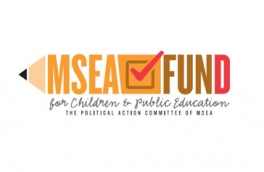Evaluations
MSEA and local associations have been working hard for years to collaborate with local superintendents, schools boards, and the Maryland State Department of Education (MSDE) to develop fair, transparent evaluation systems that help improve teaching and learning.
We believe that the purpose of educator evaluation systems are to strengthen the knowledge, skills, and classroom practices of educators to improve student learning. Local collaboration between school systems and educators—and local flexibility for jurisdictions to craft models that work best for their educators and students—are essential to developing fair, rigorous, and valid evaluation systems. High quality professional development is another critical element to successful evaluation systems. Support systems to hone the effectiveness of teacher practice and student learning should be present at the individual, school, and district level.
The Education Reform Act, Race to the Top, and Educator Evaluations
In May of 2010, the Education Reform Act (ERA) became law. In addition to providing early mentoring for teachers who may be at risk for failing to achieve tenure, the law mandated that student growth would be a “significant component” and “one of multiple measures” in a teacher’s evaluation. According to the law, no evaluation criterion could account for more than 35%. The law also mandated that evaluation models must be mutually agreed upon at the local level. Since ERA became law, locals have been hard at work revising and fine-tuning their evaluation models to reflect its provisions.
On August 24, Maryland, along with nine other states and the District of Columbia, was announced as a winner of round two of Race to the Top (RTTT). Maryland's application also touched on the issue of educator evaluations.
Ensuring that the reforms implemented through RTTT and ERA are equitable, fair, and beneficial to both students and educators is a top priority.
Implementation Snags
When the General Assembly debated the ERA, it prioritized local collaboration in developing local evaluation systems. In fact, the law required that local evaluation systems, in following general guidelines from MSDE, be mutually agreed upon by the local school system and local education association; the state was given no oversight role or authority in order to protect local autonomy and the creation of systems that made sense for local school systems.
The law asked the state to develop a default evaluation model as a model of last resort if such local collaboration could not yield agreement. However, MSDE’s actions have completely contravened the intent of the law and purpose of the default model. Instead of a model of last resort, MSDE has used the default model to bully local districts into conforming to a one-size-fits all-approach which requires 20% of the evaluation to be based on a high-stakes state test (i.e. MSA or PARCC), regardless of local agreements and the total absence of such a requirement in ERA.
Over the protests of local school systems, throughout 2012 MSDE repeatedly threatened to overturn any local evaluation system which did not include this 20% threshold. MSDE has been dictating to local districts the specific criteria to be included in teacher and principal evaluations—a power never provided to it in the ERA.
All told, such efforts flout the ERA and the good faith collaboration between local superintendents, school districts, and education associations in the development of evaluation systems that work for the local. By insisting on the default model as minimum requirements for all local models, MSDE threatens to dismantle local systems and autonomy and thumb their nose at the General Assembly by not comporting to the ERA.
MSEA leads the way on landmark legislation
Along with parents, superintendents, and school board members, MSEA led the way on several pieces of common sense legislation to improve the implementation process. These bills passed the General Assembly through a series of overwhelming and bipartisan votes during the 2014 legislative session and were signed into law by Gov. O'Malley.
- HB 1167/SB 676: Performance Evaluation Criteria - Use of Student Growth Data
Reaffirm the authority of local school districts and their bargaining units in the development and implementation of teacher and principal evaluations and guarantee that no state assessment can be used for personnel decisions through at least the 2016-17 school year. From protecting Maryland’s nationally recognized Peer Assistance and Review programs to cultivating the next great locally developed evaluation model, local autonomy is essential to Maryland’s abilities to encourage innovation and strengthen the teaching profession.
- HB 1001/SB 910: Education - Federal Elementary and Secondary Education Act - Waivers
Ensures reforms are implemented in a dynamic process where local districts can make necessary adjustments and we are not locked into a one-size-fits-all timeline and model.
“These bills will help us re-establish some common sense in the implementation process,” said MSEA President Betty Weller. “Maryland’s public schools have long been a national leader and, thanks to the General Assembly, Maryland is now a national leader for how a state can come together and get these major changes right."
As Maryland continues to struggle with the implementation of Common Core and corresponding PARCC state assessments, we support a continued moratorium on the high-stakes consequences of the problematic and unproven PARCC test for students and teachers.
Stay tuned for more updates as MSEA continues to fight for fair, transparent, and valid evaluation systems that truly help educators improve their practice and student learning.
Related News
MSEA Statement on Doug Gansler’s Anti-Teacher “Every Classroom” Ad
Doug Gansler’s latest television ad, “Every Classroom,” is just the latest reckless campaign communication that suggests he’s increasingly out of step with Democratic voters and progressive priorities. By simplistically blaming our state’s most challenged schools on teachers—during Teacher Appreciation Week, no less—Gansler not only advances a solution that would undo collective bargaining, but he does so while demonizing teachers.
MSEA Announces Slate of Educator-Endorsed Candidates
MSEA has released its updated list of endorsed candidates for statewide offices, the Senate, and the House of Delegates for the 2014 elections. MSEA had previously announced its endorsement of Lt. Governor Anthony Brown for governor, Senator Brian Frosh for attorney general, and Comptroller Peter Franchot for re-election.
Landmark Common Core Bills Pass Maryland General Assembly
April 2, 2014: Through a series of overwhelming and bipartisan votes, the Maryland General Assembly passed three major bills to address the persistent problems associated with the state’s implementation of Common Core State Standards, the new PARCC test, and new teacher evaluation systems.
MSEA Applauds House Passage of Common Sense for Common Core Bills
The House has made huge strides towards injecting some much needed common sense in Maryland’s implementation of Common Core. On the heels of the Senate’s near-unanimous passage of SB 676, the Senate cross-file of HB 1167, Maryland legislators are recognizing that students and educators need time, resources, and flexibility to get the major changes taking place in our schools right.
MSEA President Betty Weller on Senate Passage of SB 676 on Teacher Evaluations
The Senate’s near-unanimous passage of SB 676 is an important step in the right direction for instilling some much needed common sense in Maryland’s implementation of Common Core. The bill ensures that evaluations cannot include student test scores until at least the 2016-17 school year due to their misalignment and lack of validity.


